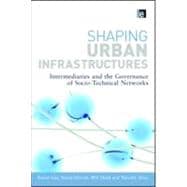
Note: Supplemental materials are not guaranteed with Rental or Used book purchases.
Purchase Benefits
Looking to rent a book? Rent Shaping Urban Infrastructures [ISBN: 9781849710688] for the semester, quarter, and short term or search our site for other textbooks by Guy, Simon; Marvin, Simon; Medd, Will; Moss, Tiimothy. Renting a textbook can save you up to 90% from the cost of buying.
| List of Figures, Tables and Boxes | p. vii |
| List of Acronyms and Abbreviations | p. ix |
| About the Contributors | p. xi |
| Preface | p. xiii |
| Intermediaries and the Reconfiguration of Urban Infrastructures: An Introduction | p. 1 |
| Conceptual Framework: Governance, Transitions and Cities | |
| Introduction | p. 15 |
| Intermediaries and the Governance of Urban Infrastructures in Transition | p. 17 |
| Systemic Intermediaries and Transition Processes | p. 36 |
| Cities Mediating Technological Transitions | p. 53 |
| Intermediaries in Network Transitions | |
| Introduction | p. 71 |
| Constructing Markets for Green Electricity: The 'Soft Power' of Intermediaries in Transforming Energy Systems | p. 75 |
| Innovation to Intermediaries: Translating the EU Urban Wastewater Directive | p. 92 |
| The Intermediation of Water Expertise in a Post-privatization Context | p. 108 |
| Mobility, Markets and 'Hidden' Intermediation: Aviation and Frequent Flying | p. 124 |
| Intermediaries and Scalar Transitions | |
| Introduction | p. 139 |
| Strategic Intermediation: Between Regional Strategy and Local Practice | p. 143 |
| Reinterpreting Regulations: Architects as Intermediaries for Zero Carbon Buildings | p. 160 |
| Smart Meters as Obligatory Intermediaries: Reconstructing Environmental Action | p. 175 |
| Bridging the Recovery Gap | p. 192 |
| Conclusions: The Transformative Power of Intermediaries | p. 209 |
| Index | p. 219 |
| Table of Contents provided by Ingram. All Rights Reserved. |
The New copy of this book will include any supplemental materials advertised. Please check the title of the book to determine if it should include any access cards, study guides, lab manuals, CDs, etc.
The Used, Rental and eBook copies of this book are not guaranteed to include any supplemental materials. Typically, only the book itself is included. This is true even if the title states it includes any access cards, study guides, lab manuals, CDs, etc.